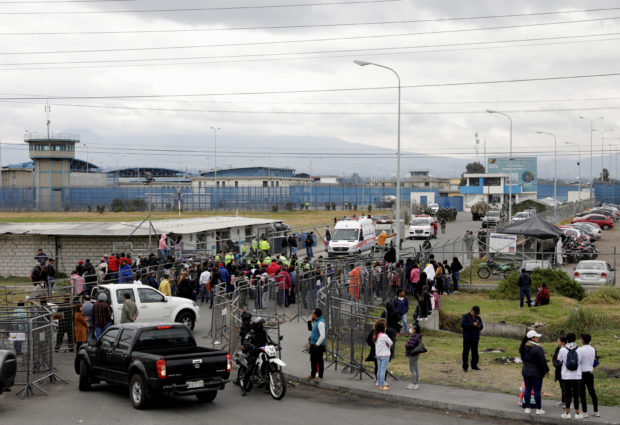Families seek answers after Ecuador prison riot leaves at least 15 dead

Family members of inmates stand outside the Cotopaxi No 1 penitentiary where several people have been killed and injured during a riot, in Latacunga, Ecuador October 4, 2022. REUTERS/Karen Toro
LATACUNGA, Ecuador — Relatives of inmates at a prison in Ecuador were waiting to find out if their loved ones were among the dead following a riot at the facility on Monday which saw at least 15 prisoners killed and 33 injured.
As families waited, riots restarted on Tuesday morning at Cotopaxi prison in Latacunga, one of the largest in Ecuador, leaving a further 11 prisoners injured, according to the SNAI prison authority.
Monday’s riot is the latest incident in a recent streak of violence inside Ecuador’s prison system, which the government says is due to gang infighting over territory and drug-trafficking routes. At least 316 inmates died in prison riots in Ecuador last year.
Ines Iguasni, a 33-year-old housewife, was trying to find out what had happened to her husband, who she said was to have been released the day of the riot.
“I’ve been here since yesterday, when they said there was a shooting,” Iguasni said over shouts from other prisoners’ family members. “I haven’t heard anything since then. How are so many weapons brought in, if they search us (every time we visit)?”
Article continues after this advertisement“We are afraid that something is still happening in there,” she said.
Article continues after this advertisementProsecutors said they were working to identify the dead.
Oswaldo Coronel, the governor of Cotopaxi province that includes the city of Latacunga, said 12 bodies had already been identified.
“At the moment there is calm, but that doesn’t mean that we’re going to lower the alert level, that is still activated,” he told journalists.
Leandro Norero, an alleged gang boss awaiting trial in a money-laundering case, may be among the dead, according to authorities.
Some 350 police officers were deployed to control the incident on Monday, the government said, while 250 soldiers remained on stand-by outside the prison.
The Inter-American Commission on Human Rights has said that Ecuador’s prison system suffers from state abandonment, inconsistent policy and poor living conditions.
The country’s prisons house some 33,500 people and exceed their maximum capacity by 11.3%, according to official figures.